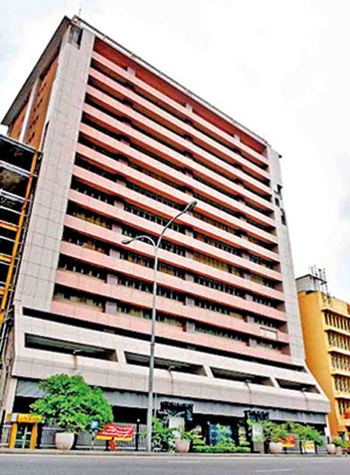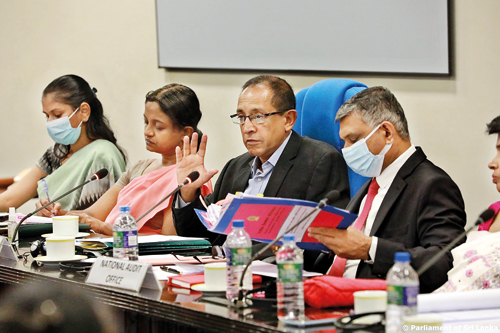News
Rs. 1.6 trillion tax target in tatters

The Inland Revenue Department headoffice in Colombo: Falling short of revenue targets
The Inland Revenue Department (IRD) will struggle to meet its Rs. 1.632 trillion revenue target this year due to a host of shortcomings including weak tax collection, the Sunday Times learns.
The Government has hiked last year’s revenue target of Rs 940bn to Rs 1.632trn. But achieving this is far from certain owing to poor initiatives from the Department, a lackadaisical attitude towards defaulters and a deficient online system that has already cost the taxpayer more than Rs. 10 billion.
The Social Security Contribution Levy (SSCL), effective since October last year, saw some 25,000 new tax files being opened. But the IRD has not even opened a separate branch dedicated to this tax.
The reintroduction of the Withholding Tax aims to raise Rs. 100bn. But the same issue plagues this category of tax also —no dedicated branch.
While several new levies were brought in last year to boost earnings, the Department has not introduced a working mechanism to monitor files opened subsequent to the launch of these taxes, Inland Revenue Service Union Joint Secretary H.A.L. Udayasiri told the Sunday Times.
Tax compliance is at a record low, having fallen from about 85% to 45% mainly due to the absence of robust follow-up systems to monitor defaulters and take action.
“Officers must be out in the field, investigating defaulters and taking action,” Mr. Udayasiri said. “But this is not happening. You can’t collect taxes by sitting in an office.”
The IRD’s Annual Performance Reports from 2016-2021 show a sharp decline in registered tax files: they stood at 1,165,969 as of December 31, 2018, and increased to 1,687,874 as of December 31, 2019.
![]() This number fell dramatically on the back of disastrous tax policies brought in by the Gotabaya Rajapaksa Government. Registered tax files dwindled to just 677,613 by December 31, 2020, and to 507,095 by December 31, 2021.
This number fell dramatically on the back of disastrous tax policies brought in by the Gotabaya Rajapaksa Government. Registered tax files dwindled to just 677,613 by December 31, 2020, and to 507,095 by December 31, 2021.
Parliament’s Committee on Public Accounts (COPA) has repeatedly taken the IRD to task over its failure to collect tax arrears. When summoned in November last year, IRD officials revealed that the total arrears of taxes, penalties and interest due as of June 30, 2022, exceeded Rs.773 billion. Of this, Rs. 201 billion was categorised as the component that could be collected without legal impediment while Rs. 572 billion was income that had been temporarily suspended due to various reasons.
The IRD has been heavily criticised for its costly, problem-plagued Revenue Administration Management Information System (RAMIS). The online platform was introduced in 2014, when Mahinda Rajapaksa was President, to modernise and improve tax collection. It was introduced in 2016 under the Yahapalana Government. It is still not functioning optimally, the Auditor General has pointed out.
A Singaporean firm was awarded the implementation contract. But RAMIS had to be upgraded when the 2017 Inland Revenue Act was passed as it was vastly different from the previous Act. The shift was plagued with problems. The IRD was unable to carry out a “change request”—a formal proposal for the alteration of a product or system.
IRD officials testified before COPA that the Department had planned to introduce “RAMIS 2.0” to give effect to the new legislation and to complete the process by May 2022. The foreign exchange crisis caused the Department to fall behind on payments to the Singaporean firm which consequently halted the upgrade. The IRD owes SGD 9.1mn to the company.
RAMIS itself has many shortcomings. They include failure to generate tax notifications; inability to obtain information on default and tax credits; inability to obtain reports according to requirements; and failure to match inputs and outputs for calculation of the Value Added Tax.
Without the upgrade, the IRD was handling about 700,000 tax files manually as of December last year.
Auditor General W.P.C. Wickramaratne, meanwhile, complained that the IRD had not provided him with the service agreement and payment details related to RAMIS. The IRD claims its agreement with the Singapore firm prevents it from handing over this information. The Auditor General has shot back that such refusal contravenes the Constitution. (The Sunday Times understands that the National Audit Office is continuing with its investigation into the RAMIS system).
On January 24 this year, IRD officials admitted before COPA that there were issues with many aspects of RAMIS, including procurement. It was proposed to form two sub-committees to investigate whether the system could be brought to an operational level in a manner suitable for the country.
One committee was to be established jointly by the Attorney General’s Department under the leadership of the Secretary of the Ministry of Finance. Its task was to examine legal conditions related to the RAMIS Agreement.
The second was to be established jointly with the University of Moratuwa, the Sri Lanka Information and Communication Technology Agency (ICTA), the IRD, and the Ministry of Finance to look into the possibility of updating the software system.
It was agreed to submit to COPA within six weeks the reports containing the conclusions of the two committees. But COPA was dissolved only days later when President Ranil Wickremesinghe prorogued Parliament on January 27. It is as yet unclear whether the newly constituted COPA will implement the measures proposed by the previous Committee in relation to RAMIS.
RAMIS had highlighted more than Rs. 500 billion in default taxes that were yet to be collected, Mr. Udayasiri said. No steps have been taken to collect them. The IRD needs a short-term action plan to collect these taxes. It cannot be put off. While legal action has been filed in a significant number of instances, the IRD still needs to do more to expedite these cases, he opined.
Mr. Udayasiri said their union has requested meetings with the President and the Treasury Secretary to brief them on these issues.

The Parliamentary Committee on Public Accounts (COPA) assisted by the National Audit Office cross examining IRD officials
“Given all these issues, it will be virtually impossible to reach the revenue target of Rs. 1,632 billion by the end of this year. We may end up with somewhere between Rs. 800-900 billion,” he said.
The Government had initially planned to give the IRD a tax revenue target of Rs. 2 trillion but had reduced it to Rs. 1,632 billion later on, said a senior Finance Ministry official. He was sceptical about the unions’ claims about falling short of the revenue target.
“Unions warned last year that it would be difficult to meet the Rs. 940 billion target we gave the IRD, but 98% of the target had been achieved by the end of the year,” he said.
The official said it was up to the IRD to be more proactive when it came to tax collection.
Repeated attempts to contact Inland Revenue Commissioner General Ranjith Hapuarachchi for comment proved futile.
The best way to say that you found the home of your dreams is by finding it on Hitad.lk. We have listings for apartments for sale or rent in Sri Lanka, no matter what locale you're looking for! Whether you live in Colombo, Galle, Kandy, Matara, Jaffna and more - we've got them all!

